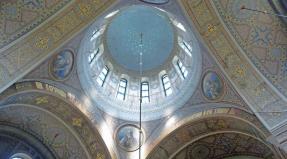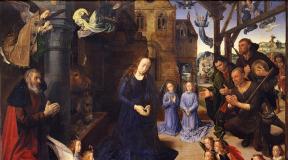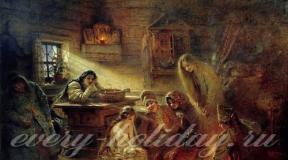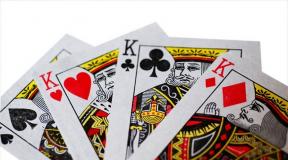Petr lavrovich lavrov attitude to the state. Petr Lavrov: biography, activities and interesting facts
LAVROV Pyotr Lavrovich (pseudonyms - Mirtov, Kedrov, Stoic, etc., more than 60 in total), Russian philosopher, sociologist, publicist, one of the ideologists of populism; colonel (1858). Nobleman.
Graduated from the Artillery School in St. Petersburg (1842), a student of M.V. Ostrogradsky. He taught mathematics there (1844-66), simultaneously at the Mikhailovskaya Artillery Academy (1855-66; professor since 1858) and the Konstantinovskiy military school. From 1852 he published articles on military technology, physical and mathematical sciences, natural science, pedagogy.
In his youth, Lavrov became acquainted with the works of the French socialists C. Fourier, C. A. Saint-Simon, P. J. Proudhon, and later was influenced by the positivist philosophers O. Comte and G. Spencer. In 1841 he published the first poem "Bedouin", later he wrote freedom-loving poems (diverged in the lists; in 1856 he sent A.I. Herzen to London 5 poems, including "Prophecy", "To the Russian people", which were published in the collection "Voices from Russia", 1857, book 4). The "New Song" was widely known ("Let us renounce the old world! ...", 1875, later called the "Workers' Marseillaise"). In the first publicistic article, "Letters on Various Contemporary Issues" (1857), Lavrov proclaimed the principle of the unity of knowledge and action, which became his life credo.
In the late 1850s - early 1860s, Lavrov took an active part in public life: in 1861 he was elected treasurer of the Society for the benefit of needy writers and scientists (Literary Fund), signed public protests against the arrest of M.L. Mikhailov, spoke in defense of student participants. riots in St. Petersburg against the reforms of E. V. Putyatin. At the same time he developed his "practical philosophy" (he called it anthropologism) (articles "Hegelism", 1858; "Essays on questions of practical philosophy. 1. Personality", 1860; "Three conversations on the modern meaning of philosophy", 1861), in the center of which - an integral personality, a person “in his real unity, as feeling and acting, as willing and knowing”. According to Lavrov, an "internally free" person inevitably comes into conflict with an unjust society, his moral duty is to change this society, to participate in the historical movement. He represented the ideal social system in the form of "moral socialism" based on the principles of "public solidarity" and "justice", a voluntary union of free and morally developed individuals. Lavrov himself, having come to the conclusion about the truth of the socialist idea, considered himself "morally obligated" to seek its practical implementation. In the summer of 1862, Lavrov became close to the underground organization "Land and Freedom" of the 1860s, although, by his own admission, contacts with it were "insignificant." In his article "Gradually" (end of 1862), from a revolutionary-democratic position, he condemned the slow, in his opinion, course of government reforms.
Editor-in-chief philosophical sciences, then editor of the "Encyclopedic Dictionary compiled by Russian scientists and writers" (vols. 1-5, 1861-63). Since 1863, he actually headed the editorial office of the Zagranichny Vestnik magazine (he was not officially approved in the position because of the negative review of the 3rd department of His Imperial Majesty's own chancery). He maintained close ties with the leaders of the women's movement (a member of the Women's Labor Society, etc.).
In April 1866, after DV Karakozov's assassination attempt on Emperor Alexander II, Lavrov was arrested on charges of spreading "harmful ideas" and having connections with people "known to the government for their criminal tendencies", and exiled to the Vologda province. In exile, Lavrov wrote one of his main works - "Historical Letters" (published in 1868-69 in the newspaper "Nedelya", a separate edition - 1870; 5th legal edition - 1917; repeatedly reprinted in the free and illegal press). In them, Lavrov distinguished the sciences into phenomenological (sociology, psychology and ethics), which study the laws of the existence of repeating phenomena and processes, and morphological (history), which study the distribution of objects and forms in space and time, in a given, single set of phenomena. He believed that in history, random modifications play a greater role than repeating and unchanging facts, isolated phenomena mean more than "copies" of the general law, the only one of its kind - more than repeating. Lavrov is considered the founder (along with NK Mikhailovsky) of the "subjective school" of the methodology of history. N. I. Kareev called him the first sociologist in Russia. The "Historical Letters" also provides a "formula for progress." Its main driving force is a “critically thinking personality”, capable of capturing new views and possessing a moral core; Such personalities become true agents of progress by uniting in a “party” that gives their struggle “direction” and unity. The most important element of Lavrov's concept is the idea of \u200b\u200bthe intelligentsia paying the debt to the people, to whom it owes its "liberation from physical labor" in the name of mental improvement. Paying their debt to the people, the intelligentsia must educate and train them, promoting the ideas of social equality and preparing the people for the revolution in order to “reduce evil in the present and in the future” (Lavrov's supporters are called “propaganda” in populism). This idea met with a lively response among the radically minded intelligentsia and had a significant impact on the formation of its worldview. According to contemporaries, "Historical Letters" became "the gospel of social revolutionary youth", ideologically prepared "going to the people."
In 1870, with the help of G. A. Lopatin, Lavrov fled from exile, emigrated to France, joined one of the sections of the 1st International, witnessed the French Revolution of 1870, as well as the Paris Commune of 1871 (summarized her experience in the book March 18, 1871 ", Published in Geneva in 1880). He moved to Zurich, then to London (became close to Karl Marx and F. Engels), edited the non-periodical "Forward!" (1873-77) and a newspaper of the same name (1875-76). He published articles about "real world outlook versus theological outlook", about "equality against monopoly". He developed his doctrine of the party: he believed that the party cannot "cause" a revolution, its task is to "facilitate and accelerate the inevitable coup" and minimize revolutionary violence; it must connect the intelligentsia with the people. Polemising with the supporters of M. A. Bakunin and P. N. Tkachev, Lavrov argued that "revolutionary violence is possible to a certain minimum", that without careful preliminary preparation, a conspiracy or spontaneous popular "riot", if successful, would only lead to a redistribution of property, i.e. that is, to the establishment of the bourgeois system. He condemned the "revolutionary itch" of youth, which, according to Lavrov, could threaten the future of Russia. Unlike the anarchists, he argued for the need to preserve the state for some time after the victory of the social revolution and the speedy transition from it to a free federation of self-governing communities. According to Lavrov, the peasantry is capable of accepting socialist ideas, since it has retained the real basis of the socialist reorganization of society - the peasant community and secular self-government.
Under pseudonyms, Lavrov continued to collaborate in the legal Russian press, published articles on the philosophy of art, literary criticism, reviews, etc., but the main topic of Lavrov's theoretical research was still philosophical problems: articles "Scientific foundations of the history of civilization" (" ", 1872, No. 2)," Essays on systematic knowledge "(ibid., 1873, No. 6), books" Experience in the history of thought "(vol. 1, issue 1, 1875)," Experience in the history of thought of modern times "(vol. . 1, part 1-2, 1888-94), "Sketch of the evolution of human thought" (1898), "The tasks of understanding history. A project for an introduction to the study of the evolution of human thought ”(1898; under the pseudonym S. S. Arnoldi); The book The Most Important Moments in the History of Thought (1903; published posthumously under the pseudonym of A. Dolengi) was preparatory materials for the generalizing encyclopedic work on the history of thought conceived by Lavrov (not completed).
At the turn of the 1870s and 80s, Lavrov's political views evolved towards greater radicalism. In 1878, he established contact with the Polish revolutionary underground, was the initiator of group meetings of the Russian revolutionary emigration, propagandizing "the practical actions of Russian socialists in Russia." If the program "Forward!" Lavrov gave priority to socio-economic transformations over political ones, believing that in conditions of economic inequality there can be no true political freedom for all, by the beginning of the 1880s he came to the conclusion that it was necessary to carry out a political upheaval in Russia as a priority by the forces of the revolutionary intelligentsia itself. , capable of creating a people's party after the overthrow of the monarchy and liquidating the economic domination of the bourgeoisie. In the early 1880s, Lavrov became close to " By the people's will". In 1881 he took part in the creation of the foreign department of the “Red Cross Society of the People's Will”. One of the editors of the Bulletin of Narodnaya Volya (1883-86). Sharing the socialist goals of Narodnaya Volya, Lavrov rejected the terrorist methods of its struggle, believing that socialists should act not against individuals, but against the system that engendered them.
Lavrov argued with Russian Marxists (G.V. Plekhanov and others): recognizing the proletariat as an important social force, Lavrov continued to adhere to the opinion that the peasantry played the main role in the development of Russia.
In 1889, Lavrov represented Russia at the International Socialist Congress in Paris, which marked the beginning of the Second International. In 1892-96 he participated in the publication of the series "Materials for the history of the Russian social-revolutionary movement", in which he published his work "Narodniks-propagandists 1873-1878" (issues 1-2 and 3-4, Geneva, 1895-96; in Russia with censorship was published in 1907, in full - in 1925) - one of the first essays on the history of the populist movement. Attempts to theoretically generalize the experience of the revolutionary movement in Russia in the second half of the 19th century were undertaken in the articles "A Look at the Past and Present of Russian Socialism" ("Calendar of" Narodnaya Volya ", 1883)," History, Socialism and the Russian Movement "(1893) and etc.
Lavrov's funeral at the Montparnasse cemetery was accompanied by a procession of many thousands. Socialists from many countries spoke at the grave.
Source: Materials for the biography of P. L. Lavrov. P., 1921. Issue. 1; Lavrov. Years of emigration: Archival materials: In 2 volumes / Selected, provided with notes and an introductory sketch by B. Sapir. Dordrecht; Boston,.
Cit .: Sobr. op. Ser. 1, 3-6. P., 1917-1920. Issue 1,2,5-9; Fav. op. on socio-political topics. M., 1934-1935. T. 1-4; Philosophy and Sociology. Fav. works: In 2 volumes. M., 1965.
Lit .: Bogatov V.V. Philosophy of Lavrov. M., 1972; Pomper Ph. R. Lavrov and the Russian revolutionary movement. Chi.,; Semenkova T. G. Economic views of P. L. Lavrov. M., 1980; Volodin A.I., Itenberg B.S.P.L. Lavrov. M., 1981; Antonov V.F. Revolutionary creativity of P. L. Lavrov. Saratov, 1984; Itenberg B. S. P. L. Lavrov in the Russian revolutionary movement. M., 1988; Vasiliev A. V. At the turn of the third millennium: to the 125th anniversary of the publication of "Historical Letters" by P. L. Lavrov. M .; Mariupol, 1995; Kazakov A.P. The theory of progress in Russian sociology at the end of the 19th century: P.L. Lavrov, N.K. Mikhailovsky, M.M. Kovalevsky. SPb., 2006.
Send your good work in the knowledge base is simple. Use the form below
Students, graduate students, young scientists using the knowledge base in their studies and work will be very grateful to you.
Posted on http://www.allbest.ru/
The ideologist of the second trend in populism - propaganda - was P.L. Lavrov. He expounded his theory in "Historical Letters", published in 1868 - 1869. He considered the leading force of historical progress to be the intelligentsia, capable of critical thinking. Lavrov argued that the peasantry is not ready for revolution, therefore it is necessary to train propagandists from educated “critically-minded individuals” whose task is to go to the people not with the aim of organizing an immediate riot, but in order to prepare the peasants for revolution through long-term propaganda of socialism.
Lavrov, Peter Lavrovich (1823-1900) - Russian philosopher, sociologist, publicist, theoretician of revolutionary populism. Aliases - Arnoldi, Dolengi, Kedrov, Mirtov, Stoic, Stoletov, about 60 in total.
Born June 2, 1823 in the village of Melikhovo, Velikolutskiy u. Pskov lips in a family of hereditary nobles. Having received a home education, he entered the Petersburg Artillery School, where he was considered the best student of M. Ostrogradsky, an academician of military sciences. After graduating from college in 1842, he was left with him as a tutor, then a teacher of mathematics. In 1844-1846 he taught mathematical subjects at the military institutions of St. Petersburg.
The revolutions of 1848-1849 in European countries stimulated Lavrov's spiritual maturation. Under their influence, he wrote a number of anti-government poems (Prophecy, To the Russian people), which were sent to London by A.I. Herzen, who immediately published them. Encyclopedically educated, from 1852 he began to publish articles on military technology, physical and mathematical sciences, natural science, pedagogy, and philosophy. Lived literary work and teaching history and foreign languages as a home teacher, having lost his inheritance due to a quarrel with his father (he was unhappy with his marriage to a widow with two children).
From 1857 he collaborated in the St. Petersburg editions "Otechestvennye zapiski", "Library for reading", "Russian word". His articles on the acutely polemical issues of our time were published in Herzen's Kolokol, in which Lavrov wrote about the need to abolish serfdom and improve the situation of the peasants.
In 1858 he was promoted to colonel, received a professor's degree, became assistant editor of the "Artillery Journal".
Disagreeing with the ideologists of Sovremennik on philosophical issues, Lavrov took part in the actions organized and carried out by them: he spoke at a student meeting in 1861, signed public protests against the arrest of the populist M.L. Mikhailova, against the draft university charter, which deprived universities of the right to autonomy. In the same year he became one of the organizers and foremen of the literary "Chess Club", which became the center of meetings of the liberal intelligentsia.
In 1862 he became close to Chernyshevsky, N.V. Shelgunov, but did not approve of their attempts to call the peasants to revolution ("To the ax!"), Considering it possible to peacefully implement "the harmony of the interests of the individual from the ruling class and the interests of the majority of the subordinate class", raised the question of the implementation of the "laws of morality".
In 1864-1866 he was the unofficial editor of the Foreign Bulletin. In April 1866, after D.V. Karakozov was arrested on Alexander II, in 1867 he was exiled to Totma, and then to the town of Kadnikov, Vologda province.
In February 1870 friends (among whom was G.A.Lopatin) helped him escape from exile. He emigrated with his family to Paris, where he was accepted as a member of the Anthropological Society. In autumn he joined the International Workingmen's Association (I International), in 1871 he became a member of the Paris Commune.
In 1871, on behalf of the Communards, he left for London, where he became close to K. Marx and F. Engels. Recognizing the proletariat as an important social force, Lavrov remained with the opinion that the peasantry played the main role in the development of Russia. In 1873-1875 he published the non-periodical Vpered, in 1875-1877 - a newspaper with the same name (published in Zurich and London). Lavrov's articles on "real world outlook against theological world outlook", on the "struggle of labor against idle use of the benefits of life", on "equality against monopoly" testified that he had become an established social egalitarian, a supporter of social equality.
He considered his main task to be the propaganda of the ideas of the revolution among the peasants, therefore, the direction close to him in populism is called, after VI Lenin, "propaganda." He shared the populist views on the peasant community as the basis of the future social system, insisted on the priority of social problems over political ones, and developed the idea of \u200b\u200bthe originality and uniqueness of Russia's historical path. Speaking out against anarchism, rebellion, revolutionary adventurism M.A. Bakunin and the conspiratorial tactics of P.N. Tkachev, Lavrov believed that "revolutionary violence is possible to a certain minimum." At the same time, in his opinion, "the restructuring of Russian society should be carried out not only for the benefit of the people, not only for the people, but also through the people."
In 1878, he established contact with the Polish and Russian revolutionary underground, was the initiator of group meetings of the Russian revolutionary emigration, propagandizing "the practical actions of Russian socialists in Russia." Associated with 1879 and with the "Black Redistribution", and with "Narodnaya Volya", he took over the representation of the latter abroad. Believing that the social revolution in Russia would emerge not from the city, but from the countryside, he called on the intelligentsia to train propagandists from the people, but he himself was also inclined to recognize terror as a method of fighting the autocracy.
In 1882, together with V.I. Zasulich was the organizer of the "Red Cross of the People's Will", seeing in it "the only revolutionary party in Russia." He was expelled by the authorities from Paris, but under a different name he returned to this city. While living there, he constantly published in foreign and Russian magazines - "Otechestvennye zapiski", "Dele", "Knowledge", using different pseudonyms.
In 1892-1896 he took part in the publication of Materials for the history of the Russian social revolutionary movement. Studying the history of socialist doctrines, he developed his own theory of workers' socialism, based on the principles of common property, universal labor and an autonomous secular community. He noted the role of Marxism in scientific socialism, but was skeptical of the activities of the Social Democrats in Russia and of Plekhanov's Emancipation of Labor group.
Having defined his worldview as "anthropologism", Lavrov considered himself the heir of world socio-theoretical thought, starting with Protagoras and the ancient skeptics and ending with O. Comte, L. Feuerbach, G. Spencer, and neo-Kantians. Later, he was influenced by some of Marx's ideas. Lavrov's philosophical writings were dominated by the spirit of "positive philosophy": the decisive importance of scientific knowledge was substantiated, and various forms of metaphysics were resolutely criticized. This was the origin of Lavrov's intransigence to the vulgar materialism of German natural scientists (K. Büchner, L. Focht).
Lavrov was not an epigone of European positivism and materialism. His philosophical and sociological views were quite independent and original. In the center of his outlook on the world there was always a certain "critically thinking personality", capable of mastering new views and possessing a rigid moral core. The progressive intelligentsia - "a small group of personalities" - he considered the engine social progress, but rather vaguely represented her as striving "to be embodied in social forms of truth and justice." Believing that only the unity of the intelligentsia with the people can create "moral socialism", he wrote: "We do not want violent power to replace the old ... The future structure of Russian society ... must embody the needs of the majority, which they themselves have recognized and understood." ... Socialism, in his opinion, was "an inevitable result of the modern process of economic life", and more than other concepts of public good, it corresponded to the moral ideal of mankind. But to make the transition to it had to help "the rural community and artel unions." He called the Paris Commune an example of a socialist state.
In the last years of his life he wrote a number of generalizing works: Experience in the history of thought of the New Time (begun in 1898 and remained unfinished); Narodnik propagandists 1873-1878 (published after his death in 1907). The tasks of understanding history and the history of thought with reflections on revolution and morality remained unfinished.
Lavrov died in Paris on January 25 (February 6) 1900, his funeral at the Montparnasse cemetery was accompanied by an eight thousandth procession. Socialists from many countries spoke at the grave.
In 1923 a street in St. Petersburg was named after him.
lavrov ideologist revolutionary populism propaganda
Posted on Allbest.ru
Similar documents
The history of the emergence and formation of socialist views of P.L. Lavrov, analysis of the objective historical context of his socially significant ideas. Subjective method as a way of understanding social processes. The ideal of socialist morality.
term paper added 01/08/2013
M.A. Bakunin - Russian revolutionary, publicist, one of the founders of anarchism, ideologist of populism. Unusual biography of Bakunin. The theoretical views of M.A. Bakunin. His political activities in Russia. Views of the theorists of populism.
abstract, added 11/13/2010
Populism as the ideology of the Russian liberation movement. The ideology of populism. Populist organizations and their activities. Characteristics of the revolutionary trend, the liberal (reformist) and legal trend of populism.
term paper, added 12/18/2008
Historical prerequisites and circumstances of the entry to the Russian throne of the young Tsar Peter I, the personal formation of this ruler. The nature and direction of Peter's reforms, their results and historical assessment. The significance of Peter and his reforms in history.
abstract, added 01/04/2012
Childhood of Peter. The wedding of Peter to the kingdom. "Khovanshchina". Peter at Preobrazhensky. Peter's innovations. Peter the diplomat. Peter's engineering interests. The place and role of Russia in international relations. An emperor woven from contradictions.
abstract added on 11/28/2006
Formation and development of the theory of populism. Organization of revolutionary populists, their tactics in the 70-80s. XIX century. The revolutionary crisis and the emergence of liberal populism. The spread of Marxism in Russia by G. Plekhanov's Emancipation of Labor group.
abstract, added 07/26/2010
Consideration of the work of pre-revolutionary historians, Soviet researchers and modern historians who wrote about the travels of Peter I to the North and, in this regard, about his visits to Vologda. Characteristics of the classification of sources according to their internal content.
thesis, added 07/10/2017
A hetman-statesman, whose activities were aimed at the struggle for the independence of Ukraine - this is how Petro Doroshenko appears in history. Doroshenko stubbornly adhered to the alliance with Turkey. This was the last associate of Khmelnitsky.
abstract, added on 04/01/2007
The internal situation of the Russian state in the second half of the 17th century. Peter the Great - the historical setting in which his life and work proceeded, a brief biographical note, appearance and character, state and economic reforms.
abstract, added 02/16/2010
Peter's childhood, learning sciences and a thirst for activity. Taking Azov and building a harbor. Shipbuilding plans of Peter the Great. External and internal transformative activities of the sovereign. Church reforms, "table of ranks", the introduction of assemblies.
Petr Lavrovich Lavrov(1823-1900) - Russian philosopher and sociologist, publicist, one of the ideologists of populism. Studied inPetersburg Artillery School (1837-1842), where he was left as a teacher of higher mathematics; then taught at the Artillery Academy, became a professor of mathematics (1858). In 1862 he became close to the secret organization "Land and Freedom", in 1866, after Karakozov's assassination attempt on Alexander II, was arrested and exiled to the Vologda province (1867). In 1870 he escaped from exile to France. He became a member of the Paris Commune, joined the First International, met K. Marx and F. Engels. In the early 80s.
became close to the party "People's Will". Several years before his death, he stopped doubting the possibility of the success of Russian Social Democracy. Died in Paris.
In the years 1858-1860. P. Lavrov showed a deep interest in philosophy: he wrote works about Hegel, "Essays on Questions of Practical Philosophy," which caused extensive controversy, and others. On his work "What is Anthropology" N.G. Chernyshevsky responded with his "Anthropological Principle in Philosophy." In exile, P. Lavrov created the most famous work - "Historical Letters", where he outlined his historiosophical concept. In accordance with the subjective method, he considered the critical person to be the key point in the development of society. P. Lavrov developed his sociological views in the mid-80s. in the book "The Social Revolution and the Tasks of Morality" (1884).
In the basic textbook of the educational complex (section 2, introduction), the importance of P.L. Lavrov as one of the first sociologists to substantiate the active role of the individual in the historical process. Below is an abbreviated chapter from this book.
PERSONALITY AND SOCIETY *
Thus, the question of the moral progress of the individual is complicated by the question of the relationship of the individual to the progress of social forms. And at the same time, you have to learn two points:
An individual can neither protect his dignity, nor develop correctly outside the satisfactory forms of social order.
The social system cannot be satisfactory outside the existence in its midst of developed individuals imbued with rational convictions.
History presents several phases in understanding the relationship of the individual to society, and in these successive phases this relationship was established differently.
Under the rule of custom, in the absence of the development of the most elementary moral concepts, the person did not set himself the task of development at all, was completely absorbed by the interests of society, outside of which he could neither think nor exist, and the unconscious
* Quoted. by: Lavrov P.L.Social revolution and the tasks of morality. Ch. 4 // Lavrov P.L.Philosophy and Sociology. Selected Works in Two Volumes), Moscow, 1965, vol. 2, pp. 412-423. The quoted text illustrates the content of Chapter 5 of the second section of the basic textbook of the educational complex on general sociology.
its development was due to the social phenomena in which she participated. Despite the fact that with such a community, the struggle within society should be reduced to a minimum, the absence in society of individuals who acted by conviction and developed a critical thought made it impossible for a satisfactory community at this stage of social evolution.
With the awakening of critical thought, the opposition of personality to society appears; it is an exceptional personality, enjoying development, a society consisting of the majority of personalities, living according to custom, accessible only to the lowest pleasures. The hero, prophet, legislator, sage, philosopher emerge from the masses subject to ordinary life, develop for themselves the ideal of an exclusive moral life, not only independent of ordinary life, but very often directly opposite to its ideals, and try to develop independently of the forms of social life around them. Since the correct development and even maintenance of personal dignity is impossible for a person outside of satisfactory forms of social order, such a moral ideal of a person who secluded himself from the interests of the society around him turned out to be unrealizable. At the same time, the developed minority could not grow rapidly in numbers, since its ideal contradicted the real conditions of any community ...
The experience of custom has retained for the majority since prehistoric times the idea of \u200b\u200bthe obligation of life in society and for society. Real interests did not allow the individual to break away from society. Therefore, with the constant development of critical thought in a person, next to the opposition that was just spoken of and which finally reached the ugly ideal of the hermit, in more modest but broader spheres, an ever more definite understanding of the mutual dependence between the development of the personality and the development of society was developed, and hence the need for owndevelopment, contribute to the improvement of forms of society and historical progress ...
But this need for progressive social activity for personal development turned out to be not only the result of correct calculation for a thinking person, but also a moral obligation for a developed person. The person began to realize that she owes all its development to society,which worked it out, and that at the same time only she can develop society through her activitiesand give it more and more satisfying forms. Translating this consciousness into the language of ethics, it can be expressed, firstly, as
Consciousness rightssociety so that the activity of the individual is devoted to his development, and rightsindividuals to direct their efforts towards this development; secondly, as a consciousness of a person dutiesrepay society for the development that it owes to it, and dutiespay him exactly, contributing to his further development ...
Make yourself a powera person can, only by becoming a member of a group that would set itself one common goal, would be strengthened by the conscious solidarity of a common conviction, and in its collective activity for society would increase the number of its supporters, just as a party with a certain progressive program would attract more and more sympathizers the name of her understanding of the tasks, of a certain era and a certain country, would instill in the rest of society more and more respect for the expediency of her actions, the strength of her organization and the energy of her struggle against all kinds of obstacles. Historical role of a progressive party, and at the same time the progressive, moral role of the individual who has become a part of the party, is determined by the degree of understanding of the tasks of social communication in general and the needs of a given era in particular, and by that energy of purposeful activity that the party of fighters for the future manifests as a collective whole.
Let us take a closer look at the conditions that are being clarified for the personality as a developed personality and striving to embody its dignity in an activity that simultaneously develops it, this very individual, and other people, for whom it has recognized an equal dignity with itself.
As a person imbued with a certain moral ideal, realized in certain forms of community, she knows or believes that the implementation of this ideal and this community is possible only with the energetic collective activity of the social group into which she, the person, entered in the name of her convictions and whose members share with her her beliefs and her determination to embody them. Therefore, the main part of her moral activity is solidarity with these comrades in development and in activities in the name of this development. For a developed personality, other party members also stand behind this tight slope; they have to be supported, controlled in their activities; they have to grasp the idea they undertook to serve, gradually developing in themselves understanding and energy, relying mainly on the organization of the party into which they were waxed. Outside the limits of the party are, on the one hand, possible alliesin the near or distant future, groups, or have not developed a proper
understanding the tasks of personal development, social solidarity and historical progress, or made it impossible to develop this understanding under the given conditions of life. We must try to make them out of allies possibleallies valid.On the other hand, stand enemiestasks set by the party, enemies who have to be forced to make concessions or weakened, with whom onlyfight at the moment, and only later, after defeating them, will one have to ask oneself: how to treat them in the name of the demands of justice and universal human dignity?
The first additional definition of a developed personality follows from the attitude of a developed personality to closest comrades in conviction: the moral dignity of a person struggling for progress is realizable only with a group that shares personal development.Once a person has realized that the people of this group are his comrades in conviction, he must remember that their success is his success; their strength is his strength; the expansion of their moral significance is the growth of his dignity; the sacrifices made to the strengthening, consolidation and expansion of the party are sacrifices made to one's own strength and dignity. Any action that would cause unnecessary risk for the people of the Party is a crime for the person who belongs to it. Any action that shakes the significance of the party, undermines its solidarity organization, prevents it from using all its forces to achieve a common goal and to fight against common enemies, can only be justified by the individual's retreat from the moral and social ideal that until then had guided it, or by the consciousness of it. sufficient forces within and around oneself to form a new party capable at the given moment, under the given conditions, better to realize the same ideal; otherwise, it is an immoral betrayal of one's own conviction.
The fact that the progressive ideal of personal and social morality can only be realized by collective forces eliminates the enormous difficulty that constantly presents itself in striving for progressive activity for individuals who are aware of a lack of preparedness, a lack of a completely clear understanding of where to go and how to act in the given conditions, and hesitating before the decision to throw all their strength and all their life into a certain form of social struggle, for which, perhaps, they do not have enough strength and energy. For a lonely person and among a sleepy society, where the struggle of parties for a better future has not yet been determined, this difficulty is really enormous, and
It is not surprising if only people who are especially energetic are developed from it. The less powerful are sucked in by the vulgarity of the environment, or they find an outcome in suicide if they are unable to come to terms with any modest useful activity, accessible, as mentioned above, to everyone, but activity that is much more important in the sense of preserving for the futuretradition of progressive aspirations than its immediate results. But as soon as the struggle for the future has begun in society and the banners of the parties are unfurled, the most powerless, most unprepared personality has no reason to waver. If an aversion from existing evil and a striving for the best awoke in her, then she can choose among the banners of the fighting parties the one that seems to her to be the most progressive or at least the most preparing the necessary conditions for progress. To this banner she and shouldget started. Powerless in itself in its loneliness, in its unpreparedness, a person will find in a group collective strength, advice for personal activity, an example for collective activity. Since it is essential for the group she joins to have people as developed and trained as possible, and at the same time, it is just as important to use all the personal forces of the group most expediently, then the instructions of comrades who are more prepared and familiar with the matter can be the only one a useful guide for new advocates of the progressive cause. Of course, mistakes and shortcomings are found everywhere, but an unprepared person left to himself will probably make even more mistakes, develop even greater shortcomings in himself. Of course, sometimes energy can be wasted not entirely expediently, but, remaining alone, a person will almost certainly spend all his energy in vain or will be sucked in by the quagmire of social vulgarity. Of course, not all members of the group into which the person has entered will meet her expectations, but, recognizing that society needs restructuring, that there is evil in it, against which it is necessary to fight, every thinking person should expect in advance that this very evil has caused personalities that make up society, numerous shortcomings, and at the same time must remember that apart from personalities, as they are, no progress is possible. Once recognizing that this group, this party supports the leading banner and concludes representatives of advanced aspirations, a person who is still wavering, not yet confident in his strength, there is only one way out: to give his strength to this party and be guided by its advice.
2 (14) .06.1823, p. Melekhovo, Velikoluksky district, Pskov province, - 25.01 (6.02) .1900, Paris
critic, publicist, philosopher, sociologist, poet. Revolutionary populist. The son of a landowner, a retired colonel, who belonged to an old noble family; mother, nee Gandwig, is from a Russified Swedish family. Received a good education at home (from childhood he knew French, German). Studied at the Artillery School in St. Petersburg (1837-1842); at the end of the officer class (1844), he was left, on the recommendation of Academician M.V. Ostrogradsky, at the school as a tutor of mathematical sciences. Colonel (1858), professor at the Artillery Academy.
In 1856 he sent his poems to Herzen, of which two - "Prophecy", "To the Russian people", denouncing Nicholas I, were published in the collection "Voices from Russia" (1857. Book IV). He promoted socialist ideas in the "Encyclopedic Dictionary Compiled by Russian Scientists and Writers" (1861-1863), edited by him (from the second volume - in full), brought to the letter "E" and banned, in the journal "Foreign Bulletin" (1864-1866), where he led the department "Foreign life". He signed under the protest of Petersburg writers against the arrest of M.L. Mikhailov, participated in student riots in St. Petersburg in the fall of 1861, organized material assistance to prisoners through the Literary Fund. In 1862 he joined the underground organization "Land and Freedom". He became close to Chernyshevsky shortly before his arrest. From 1862 after him. Squad III was under surveillance.
On April 25, 1866, shortly after D.V. Karakozov's assassination attempt on Alexander II, Lavrov was arrested, accused of a "harmful way of thinking", connections with political criminals, etc., dismissed from service and by a military court sentence (January 1867 .) was exiled to the Vologda province, where he lived from 1867 to 1870 (Totma, Vologda, Kadnikov). In 1868-1869. in the newspaper "Nedelya" published under the pseudonym P. Mirtov "Historical Letters" (separate revised ed. 1870), which became a manifesto of revolutionary populism.
In February 1870, with the help of G.A. Lopatin, he fled from Kadnikov through Petersburg to Paris. He was no longer at home. His almost 30-year life abroad (since 1877 - almost without a break in Paris) is filled with revolutionary activities. He is a member of the First International, a member of the Paris Commune of 1871, sent by her to London to organize international assistance (which was the occasion for a meeting with Karl Marx and F. Engels), the head of the Russian political emigration. Like Herzen, Lavrov. was a tireless publisher of revolutionary literature: he published and edited the "non-periodic review" "Forward!" and a newspaper with the same name, edited by the journal "Bulletin" Narodnaya Volya "together with L.A. Tikhomirov (Paris, 1883-1886)," Materials for the history of the Russian social-revolutionary movement "(Paris, 1893-1896). collections "Forward!" also arose a book publishing of the same name, which published from 1873 to 1877 16 titles of books and brochures, including "Letters without an address" and "Prologue" by Chernyshevsky, "The Tale of the Wise Naumovna" and "Out of the Fire into the fire! "S.M. Kravchinsky.
He sharply condemned the activities of S.G. Nechaev, criticized the anarchism of M.A. Bakunin and the conspiratorial tactics of P.N. Tkachev. In the program, published in the first collection "Forward!", The position was put forward in the first place that "the restructuring of Russian society should be accomplished not only with the aim of the people's good, not only for the people, but also through the people.
Cit .: Fav. op. on socio-political themes in eight volumes: Vol. I-IV / Introductory article and general ed. I.A. Teodorovich; Comments, bibliography and biogr. sketches by I.S. Knizhnik-Vetrov. M., 1934-1935; Philosophy and Sociology. Fav. Prod .: In 2 t. / Comp. and note. I.S. Knizhnik-Vetrov; Introductory article I.S. Knizhnik-Vetrov and A.F. Okulov. M., 1965; Etudes on Western Literature / Ed. A. Gizetti, P. Vityazeva; Introductory article A. Gisetti. Pg., 1923; Poems / Democratic Poets of the 1870s-1880s L., 1968.
Lit .: Correspondence of K. Marx and F. Engels with Russian politicians. 2nd ed. M., 1951; G.V. Plekhanov Synopsis of speech on the day of P.L. Lavrov's funeral / Plekhanov's literary heritage. M., 1934.Sat. 1; "Forward!" Sat. articles dedicated to the memory of P.L. Lavrov / Ed. P. Vityazeva. Pg., 1920; P.L. Lavrov. Articles, memoirs, materials. Pb., 1922. Sat. IV; Volodin A.I., Itenberg B.S. Lavrov. M., 1981; Antonov V.F. P.L. Lavrov's revolutionary creativity. Saratov, 1984; Konovalov V.N. Literary criticism of populism. Kazan, 1978. S. 69-82; Lukin V.N. P.L. Lavrov as an esthetician and literary critic. Saratov, 1979; Budanova N.F. I.S.Turgenev's novel "New" and revolutionary populism of the 1870s. L., 1983; Myslyakov V.A. Saltykov-Shchedrin and populist democracy. L., 1984. S. 55-99; Itenberg B.S. P.L. Lavrov in the Russian revolutionary movement. M., 1988.
Pyotr Lavrovich Lavrov (aliases Mirtov, Arnoldi, and etc.; June 2, 1823, Melekhovo, Pskov province - January 25, 1901, Paris, France) - Russian sociologist, philosopher, publicist and revolutionary, historian. One of the ideologues of populism.
Biography
A nobleman by birth. Father, Lavr Stepanovich, - a participant in the Patriotic War of 1812, a personal friend of A.A.Arakcheev, a retired colonel of artillery. Mother, Elizaveta Karlovna (née Gandwig) is from a Russified Swedish family. He received a good education at home, from childhood he spoke French and German (in the circle of his reading - books from his father's French library). In 1837 he entered the artillery school in St. Petersburg (1837-1842), where he was considered the best student of M. Ostrogradsky, academician of military sciences. After graduating from college in 1842, he was left with him as a tutor. I independently studied literature on social sciences, in particular, he got acquainted with the works of utopian socialists, wrote poetry and showed exceptional ability for mathematics and craving for knowledge in general, without which
man is nothing ... he is naked and weak in the hands of nature, he is insignificant and harmful in societyFrom the diary
In 1844, after graduating from the higher officer classes, he was left at the school as a tutor in mathematical sciences, which marked the beginning of his military teaching career - at the St. observer). During the Crimean War, he was near Narva, although, as he wrote in his autobiography (in a third person), "he did not happen to participate in any military actions." In 1847 Lavrov married a reputedly beautiful widow with two children, titular councilor Antonina Khristianovna Loveiko (sister of General A. Kh. Kapger), which deprived him of material support from his father. The need to support a large family (Lavrov only had four children of his own) and an acute lack of salary make him write special articles for the "Artillery Journal" and earn extra money as tutoring. After the death of his father (1852) and elder brother Mikhail, life in the material sense becomes more secured.
Lavrov studied the latest European philosophy, published his poems with A. I. Herzen in the collection Voices from Russia, participated in the work on the Encyclopedic Dictionary, published a lot on a wide range of issues: philosophy, sociology, the history of social thought, problems of public morality , art, literature, public education.
In 1860, his first book, Essays on Questions of Practical Philosophy, was published. Lavrov believed that a moral person inevitably comes into conflict with an unjust society. An ideal society in relation to the individual can be a system based on a voluntary union of free and moral people.
In the 1860s he took an active part in literature and social work and in the student movement, became close to N. G. Chernyshevsky, was a member of the first "Earth and Freedom". After the attempt on the life of D. V. Karakozov on Alexander II, he was arrested, found guilty of "spreading harmful ideas", "sympathy and closeness to people known to the government for their harmful direction" (Chernyshevsky, Mikhailov and Professor P. V. Pavlov), and January 1867 sentenced to exile in the Vologda province (Totma, Vologda, Kadnikov), where he lived from 1867 to 1870 (see .. In Totma, he met A. P. Chaplitskaya, a Polish woman who was arrested for participating in the Polish uprising of 1863 -1864, who became his common-law wife (d. 1872).
In exile, Lavrov wrote his most famous work - "Historical Letters". The "Historical Letters" called for "critically thinking" and "energetically striving for the truth", especially young people, to wake up, to understand the tasks of the historical moment, the needs of the people, to help them realize their strength and together with them begin to create history, to the fight against an old world mired in lies and injustice. Historical Letters, being a socio-political work, came out when the revolutionary intelligentsia, especially young people, were looking for new opportunities to apply their forces to participate in the liberation of the people: N. G. Chernyshevsky's hopes for a popular uprising after the abolition of serfdom did not come true; DI Pisarev's "theory of realism" with its cult of natural science did not promise quick results; the conspiratorial activities of the "Narodnaya repression" by S. G. Nechaev were used by the government to discredit the "nihilists". Therefore, in the situation of the late 1860s - early 1870s. this work of Lavrov became a "thunderclap", one of the ideological stimuli for the practical activities of revolutionary intellectuals.



















